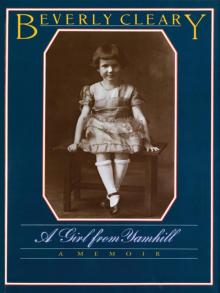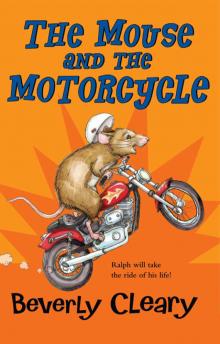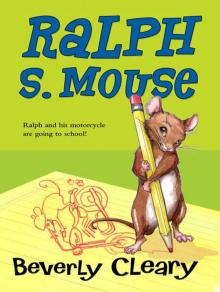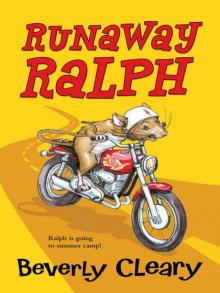- Home
- Beverly Cleary
Strider Page 6
Strider Read online
Page 6
We were both silent. I could hear the little sisters shrieking in the background, so I knew he had not hung up on me.
Finally Barry said, “You didn’t need to give up custody.”
“I guess I was upset about a lot of things,” I admitted, “so I said things I was sorry for.” Maybe it’s easier to talk about some things over the telephone, rather than face to face.
“That’s what Mom said.” Barry was silent a moment while I thought, Thank you, Mrs. Brinkerhoff, for understanding.
Finally Barry said, “You keep him, and I will be his friend. He has shown he likes you best, and I know you exercise him more than I do. Anyway, I don’t like to wash his dish, and he makes my sisters’ cats nervous.”
“Gee, Barry…” I was so grateful I could hardly talk.
“That’s okay.” Barry understood.
When I got hold of myself, I felt I had to mention one worry. “If I keep him, people will laugh and say they knew we couldn’t manage joint custody. You know how they talked.”
“Yeah,” agreed Barry. “They’re saying it already. There ought to be some way around all their stupid remarks they think are so funny.”
In our silence, I had an idea, a really brilliant idea. “When Mom and Dad got divorced, I heard something about if a kid is old enough and smart enough to form an intelligent preference, he can have something to say about custody. Or something like that. I know I am right about the intelligent preference bit.”
“Hey, that sounds great!” Barry was excited. “We can just say Strider is now mature enough to express an intelligent preference, and he decided to live with you.” We laughed like old times.
“After all, how many dogs are mature enough to read?” I asked, and we laughed some more. Then I had another thought. “The trouble is, I’m going out for track. I can exercise him in the morning, but if I leave him inside during the day, he eats the rug.”
“No problem,” said Barry. “Just leave him in our yard like always, and I’ll exercise him during track season. I need to stay in shape for football next year.”
In a little while, Barry came down the path with Strider’s leash and posture dish. We didn’t have to say we were glad to be friends again. We both knew it. I also knew, but would never say, that Barry is relieved to be rid of the entire responsibility of Strider. I don’t mind washing his dish.
I hugged my dog. Both halves of him are mine!
March 1
The first of the month, I was about to hide Strider in the bathroom before Mrs. Smerling could come demanding rent money. Suddenly I changed my mind. Calling this place a shack gets on Mom’s nerves; sneaking around worrying about rent being raised because of my dog gets on my nerves.
Mrs. Smerling’s thong sandals came slapping down the path; I opened the door and, with Strider by my side, handed her the rent check Mom had waiting on the chair by the door. “Mrs. Smerling, Strider is my dog now,” I informed her. “He has expressed an intelligent preference to live with me instead of living in joint custody.”
Mrs. Smerling looked surprised and said, “So?”
“So do you object to my keeping a dog?” I felt a little sick, as if Mom and I were about to become street people.
“You haven’t fooled me for one minute,” said Mrs. Smerling. “I haven’t objected yet.”
Whew! I decided to press my luck. “Are you planning to raise our rent because of him?”
“Not unless I have to clean up dog messes.”
“You won’t,” I promised. “I’ll get a pooper-scooper or an old license plate or something.”
“You’re a good kid, Leigh,” Mrs. Smerling said. She started to leave, then turned back and asked, “Don’t you need a fence for your dog?”
Had she noticed the chewed rug? Probably. “A fence would help,” I had to agree.
“So build one,” said Mrs. Smerling. “A good fence would add to the value of my property.” She went slapping down the path.
Drying her hair with a towel, Mom came into the room. She was laughing. “Leigh, you amaze me. How did you get away with that?”
I shrugged. “By being the man in the family.” Now maybe Mom won’t miss her little boy so much.
Then Mom frowned. “It seemed to me Mrs. Smerling made a fence sound compulsory.”
That was just what I was beginning to think.
March 2
A fence, a fence, my kingdom for a fence, as Shakespeare would say.
The yard already has a fence, overgrown with bushes, along one side and across the back. That leaves the side along the gas station and the space from there to the apartment house in front of our cottage. Barry and Kevin offered to help me build a fence from packing crates from the furniture store down the street, but I have a feeling Mrs. Smerling wouldn’t think that kind of fence would increase the value of her property.
Kevin offered to pay for a fence. I couldn’t let him do that, and Mom would never allow it. Barry says his father would build me a fence if we asked him. He has all the tools. This was nice of Barry, but I couldn’t accept that offer either. I have my pride, even if I don’t have enough money for a fence.
Problem solving, and I don’t mean algebra, seems to be my life’s work. Maybe it’s everyone’s life’s work.
March 12
I got to thinking: if Barry’s father would be willing to build Strider a fence, what about my father? Without consulting Mom, I phoned him at his trailer in Salinas. “Dad, would you build me a fence?” No use wasting words.
“Where at?” He sounded surprised. I explained. “Sure, no problem,” he agreed and didn’t waste time. That same evening he drove over to take measurements by the light from the gas station next door.
A few days later, when I came home from school, I found evenly spaced four-by-fours six feet high set in concrete which had only begun to harden. I pressed Strider’s paw into it by the post where the gate will go. Now my dog is immortalized.
Yesterday, when Strider and I returned from my mopping job, I saw Dad’s pickup loaded with lumber, hog wire, a gate already built, and Bandit. Dad was talking to Mom while Mrs. Smerling watched out the window.
“Come on, Leigh. Pitch in,” said Dad. Mom said she had a lot of errands to do and wouldn’t be home till after work. I think she was just making excuses not to be around Dad.
Dad and I went to work nailing stringers in place. I felt good working with Dad, getting sweaty, while Strider sat watching. Bandit just stayed in the truck.
About the time all the stringers were in place, a lady drove up in a red Toyota, got out, and walked up the path. “Hi, Bill,” she said. “How’s it going?”
Dad kissed her and said, “Great. Alice, this is my son, Leigh.”
I remembered to wipe my hand on the seat of my pants, hold it out, and say, “How do you do?” which wasn’t easy because I was so surprised. Alice looked a little older than Mom, and plumper, but she was attractive. Nothing flashy.
“Hello, Leigh,” she said as if she liked me. She scratched Strider behind his ear when he got up to sniff her over. She said she had errands to do and “just thought I would come by to see how the fence was coming along.” Then she drove off.
Suspicious, I asked, “She come to look me over?”
Dad grinned. “Could be.”
“You serious?”
“Maybe.”
“Any kids?”
“Girl in college.”
Old Wounded-hair wouldn’t approve of this conversation. Dad and I seemed unable to talk in complete sentences.
By midafternoon, without stopping to eat, we had stapled the hog wire to the fence posts, hung the gate, and screwed the latch in place. Strider had a neat six-foot fence that should increase the value of Mrs. Smerling’s property. I thanked Dad, who said, “That’s okay. Let’s go get something to eat.”
We washed around the edges and, leaving Strider looking surprised behind his fence, went off to a Mexican restaurant where we both ordered the special Mexican pla
tter with enchiladas, chiles rellenos, tacos, refried beans, and rice. Dad had a beer, and I asked for buttermilk, which tasted good with Mexican food.
We ate in silence for a while. Then Dad rolled a tortilla, looked straight at me, and said, “How come you never asked me for anything before? It always seemed like you wanted a ride in my rig, but you didn’t want me.”
I was stunned and embarrassed by this speech. Dad was never good at expressing his feelings. Maybe I wasn’t either. Wanted him! For a long time after the divorce, I had ached for him.
“I guess I felt you had abandoned me,” I confessed, “even if you did let me ride with you sometimes.”
Dad sighed. “I know I’ve let you down, but I’ve missed you, kid, and I’ve grown up a lot in the last couple of years.”
This time I didn’t get angry the way I used to when Dad called me a kid. Now “kid” sounds like an affectionate nickname, not a substitute for my real name, which I used to think he had forgotten.
Dad and I had our first real conversation. I didn’t mind so much when he began to talk about my future, although I would just as soon he hadn’t brought it up. As he dropped me off at the cottage, he said, “We’ll have to build Strider a doghouse.”
When Mom came home from work, I woke up and told her about Alice. “Good,” she said, and meant it. “I’m really glad he’s found someone.” Maybe, because he lives so close, she was afraid he would hang around here because he was lonesome. Coming over to build a doghouse is different.
March 13
Now that I have solved a few of my problems, but not my future, my feet feel light. I run faster, as if I had wings on my heels like the Greek god Mercury in florists’ ads, except Mercury didn’t have to wear track shoes because his feet didn’t touch the ground.
Coach wants me to run the eight hundred meters and Kevin to run the fifteen hundred meters. Geneva no longer knocks over so many hurdles.
My days whiz by. Barry runs with Strider after school and brings him to the track for me to take home.
While I mop, I study my Spanish: Esta mesa es de madera. Está sobre la mesa.
While I run, I think about the short stories we are studying. This semester’s English teacher, Mr. Drexler, isn’t a teacher who pounces on kids trying to look inconspicuous and demands, “What is the theme of this story?” He asks, “Would someone like to volunteer the theme of this story?” because he knows themes are nobody’s favorite question. I like to volunteer, even if I am sometimes wrong.
March 14
Today I did a stupid thing. I watched Geneva run the hurdles, and afterward, when she was walking to cool down, I got up my courage to walk beside her. (Not too close.)
“Hi, Leigh,” she said.
“Good work,” I said, “but did you ever think your hair might offer wind resistance? Maybe if you tied it back, it would help your time.” Then I wondered if she would think I had said the wrong thing.
She put her hand to her hair, which curled around her face in damp tendrils. “I never thought of that,” she admitted. “Thanks for the tip.”
“Your hair is sure pretty,” I said to make sure she wouldn’t feel I was criticizing. For some reason I thought of Barry’s grandmother’s beautiful needle-art knitting with soft, colorful yarns. Without thinking, I said, “Your hair would look nice knit into a sweater.”
Geneva stopped and faced me with her hands on her hips. “Leigh Botts, you’re really weird!” She turned and ran down the track.
I felt like bagging my head.
March 15
Track, track, track.
School is more interesting this semester, especially the study of short stories in English. I study, fall asleep, get up, run with Strider, work out after school. Friday afternoon the team competes against King City in our first meet of the season.
I think of the Olympics on TV: trumpets, sunshine, flags, great-looking athletes from all over the world, the winners struggling to hold back tears when ribbons holding medals are placed over their heads while their national anthems are played and the crowd cheers.
Next to exercising Strider, working out is the best part of the day. I love the grit of my spikes biting into our sandy track, the exhilaration I feel after I run, the satisfaction of cutting down my time. Kidding around in the locker room is fun, even when someone tries to snap a towel at me. I am proud of my gold and red sweats. Geneva smiles and waves at me across the track, so she can’t be angry. Barry meets me at the track with my dog.
Sometimes Kevin comes home with me, or we both go to Barry’s house. The first time Kevin came here, he blurted, “You mean you live here?” Then he apologized for being rude. Kevin has manners.
“Sure,” I said. “It keeps the rain off.”
Now Kevin likes to come here rather than be alone in a big house while his mother is out playing bridge or, as he says, playing at being an interior decorator. Sometimes we cook. I taught him to make an omelette. If he knows Mom will be home for supper, he wears a necktie! Mom says he’s a nice boy with an aura of sadness about him, which must be the sort of boy I was when I was in the sixth grade and my parents were just divorced.
Now I have three friends: Barry, Geneva, and Kevin. I am part of the track crowd. I fit in. I belong.
March 17
My first track meet was about as far from the Olympics as it is possible to get. King City’s team is about three times the size of ours. Every kid in King City seemed to have climbed off their buses. Maybe there isn’t much to do down there. Wet clouds hung over the field. The two teams piled bottled water, books, jackets, and junk food in separate sections of the cleat-pitted bleachers as if we were staking out territory.
I was surprised at the friendly way members of the rival varsity teams greeted one another. Some mothers and a few fathers, all of them bundled up as if they expected a blizzard and carrying thermos bottles, climbed into the stands.
Runners practiced sprints between the fresh chalk lanes on the track or twisted and stretched on the playing field. A relay team, all four running so close together their legs looked like pistons, practiced passing the baton.
When the meet started, everyone seemed to cheer for everyone, but I cheered loudest for Geneva, who came in third in the frosh-soph hurdles. I noticed her hair was pulled back and twisted in a knot.
When the loudspeaker blared, “First call, frosh-soph eight hundred,” my stomach tightened. I climbed down out of the bleachers to begin my warm-up with the rest of the runners. At the second call, we practiced a few sprints to keep limber, and when the loudspeaker squawked, “Last call,” we reported to the starter for our lane assignments.
We peeled off our sweats, took our places. “Runners to your marks. Set.” We leaned forward and waited for the starter’s gun. A cold wind had come up, making my muscles freeze. I felt a few drops of rain.
Bang! We were off, only to be called back. Someone had made a false start. We were started for the second time. My feet hit the track. The crowd was yelling. Stray words floated into my brain as I stretched my stride: “Hit the road, Jack!” “Put it in high, Felipe!” One lap, and I was still going strong. Coach was beside me. “Move your arms, Leigh!” he shouted as I passed. I moved my arms and prayed I could breathe to the end of the race. I heard Strider bark. Geneva’s voice reached me. “Leigh! Full out, Leigh!” I tried harder as I rounded the curve on the far side of the track, rounded another, and the race was over. A King City guy had won.
I stepped off the track and threw up on the grass.
Coach was right there, his arm around my shoulders. “It’s all right, son,” he said. “Often happens to beginners. Get your sweats on and keep moving.”
After I cooled down, I climbed into the stands to sit beside Strider and Barry. The loudspeaker announced, “Leigh Botts, P.G., third place, 2:27.”
“Not bad,” said Barry as Strider licked the salty sweat from my hand. “King City is hard to beat.”
“Nice try,” a varsity runner said. Geneva g
ave me a thumbs-up. Her hair had begun to fall down around her shoulders.
Two minutes and twenty-seven seconds. When I was running, it seemed forever.
Nobody mentioned my throwing up.
March 31
Run with Strider, school, track, study, sleep, start all over again. That’s the way the days go. Cutting my time by two crummy seconds took hours of hard work. I win some, lose some.
Other team members are interesting to watch. There is the good-looking senior pole-vaulter who walks with a swing to his broad shoulders because he knows he will win and all the girls are looking at him, and the varsity eight hundred runner, a real show-off, who is always doing high-stepping sprints in front of the crowd. He has great form; he just doesn’t run fast enough.
A girl, a chubby miler on the frosh-soph team, is really fascinating. By the fourth lap, all the other runners have passed her and reached the finish line, but she keeps chugging along with the whole track to herself. Everyone watches, nobody makes fun of her, and when she finishes, a big cheer goes up. I wonder why she runs a mile when she knows she will never win. Maybe she wants to lose weight. Whatever her reason, she never gives up. I admire that.
Bus trips to other schools are fun, with the team laughing and making jokes on the way there and sleeping or talking over the meet on the way back. If the trip is long enough, we stop at a fast food place on our return. The varsity team goes in first, with the frosh-soph team following. Restaurant managers never look very happy to see us coming.
This morning when Strider and I were running along Ocean View, I saw a sign on Lovers Point announcing the Annual Lovers Point Weed Pull, April 1, coffee and doughnuts provided, and free cypress trees to all participants. I liked the idea of people volunteering to pull weeds to keep the cliff along the bay beautiful. I thought maybe I would pull a few myself. I owe it to the cliff for being such a great place to work out.

 Ramona Quimby, Age 8
Ramona Quimby, Age 8 Dear Mr. Henshaw
Dear Mr. Henshaw Beezus and Ramona
Beezus and Ramona A Girl from Yamhill
A Girl from Yamhill Ramona Forever
Ramona Forever Jean and Johnny
Jean and Johnny The Luckiest Girl
The Luckiest Girl Emily's Runaway Imagination
Emily's Runaway Imagination Ribsy
Ribsy Ramona the Pest
Ramona the Pest Socks
Socks Ramona's World
Ramona's World Strider
Strider The Mouse and the Motorcycle
The Mouse and the Motorcycle Henry and the Paper Route
Henry and the Paper Route Ramona the Brave
Ramona the Brave Henry Huggins
Henry Huggins Ramona and Her Mother
Ramona and Her Mother Ralph S. Mouse
Ralph S. Mouse Sister of the Bride
Sister of the Bride Henry and the Clubhouse
Henry and the Clubhouse Muggie Maggie
Muggie Maggie Runaway Ralph
Runaway Ralph Ramona and Her Father
Ramona and Her Father Henry and Ribsy
Henry and Ribsy Henry and Beezus
Henry and Beezus Two Times the Fun
Two Times the Fun Fifteen
Fifteen Mitch and Amy
Mitch and Amy